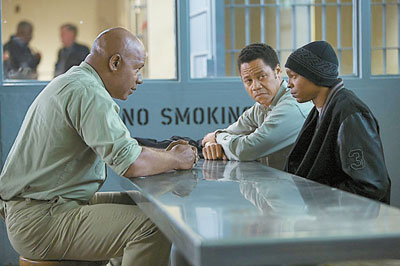
Based on a true story, the film tells how ex-con* Eugene Brown has turned his prison experience studying chess into a head-start program* for children from poor families.
After 18 years in prison for robbery, Brown (Cuba Gooding, Jr.) becomes a free man, returning to the Washington, D.C.-area neighborhood where he came up as a gang* member.
To break away from his past, Brown gets a job as a janitor* at a local high school, where his hard work wins the trust of the principal (Lisa Gay Hamilton). She makes him a detention* monitor for a class of troublemakers.
As he has learned to play chess in prison, Brown tries to let the kids believe that playing chess will help keep them out of trouble and provide some useful life lessons as well. But most of them aren’t interested, particularly* Clifton (Carlton Byrd), his sidekick* Tahime (Malcolm Mays) and their childhood friend Peanut (Kevin Hendricks).
Then, almost as soon as he’s taught them the basics of chess, his boss fires him for misrepresenting* his prison record.
Undiscouraged, Brown rents a place and opens the “Big Chair Chess Club.” He gets the students back to play chess so that they can stay away from street fights and have a better future.
But poverty*, crime* and family problems make things difficult. Talented Tahime can’t seem to break free from Clifton’s schemes* and his drug-addicted* mother’s harassment*.
If Brown is going to reach these kids, he will have to make them believe that learning chess can help them live a better life, although he’s a flawed* role model himself.
The film shows that sometimes people can find a creative way out of poverty that is well worth trying.
This feel-good film is very much the type of inspirational* filmmaking that common moviegoers often criticize the industry for not producing more often.(SD-Agencies)
|

